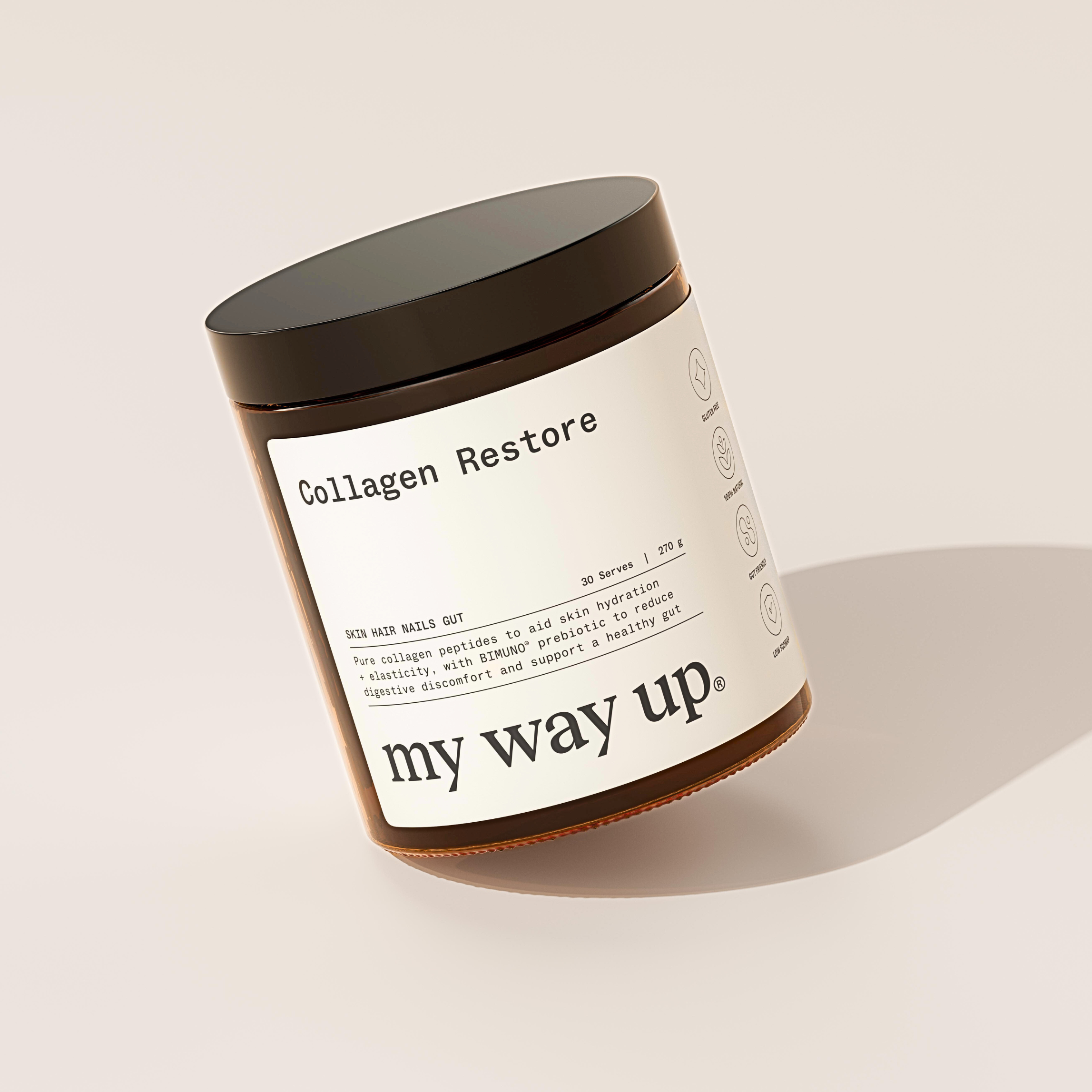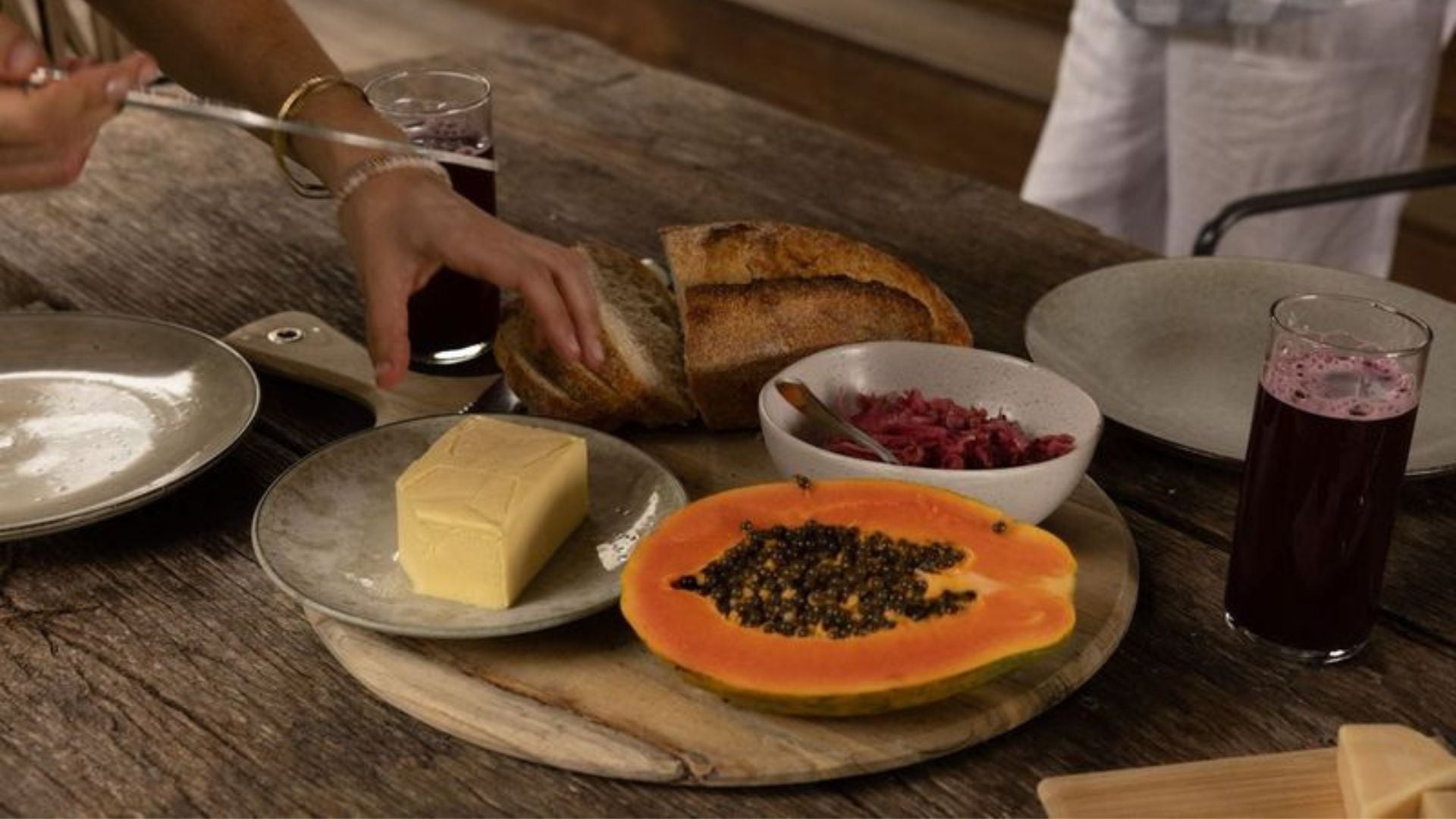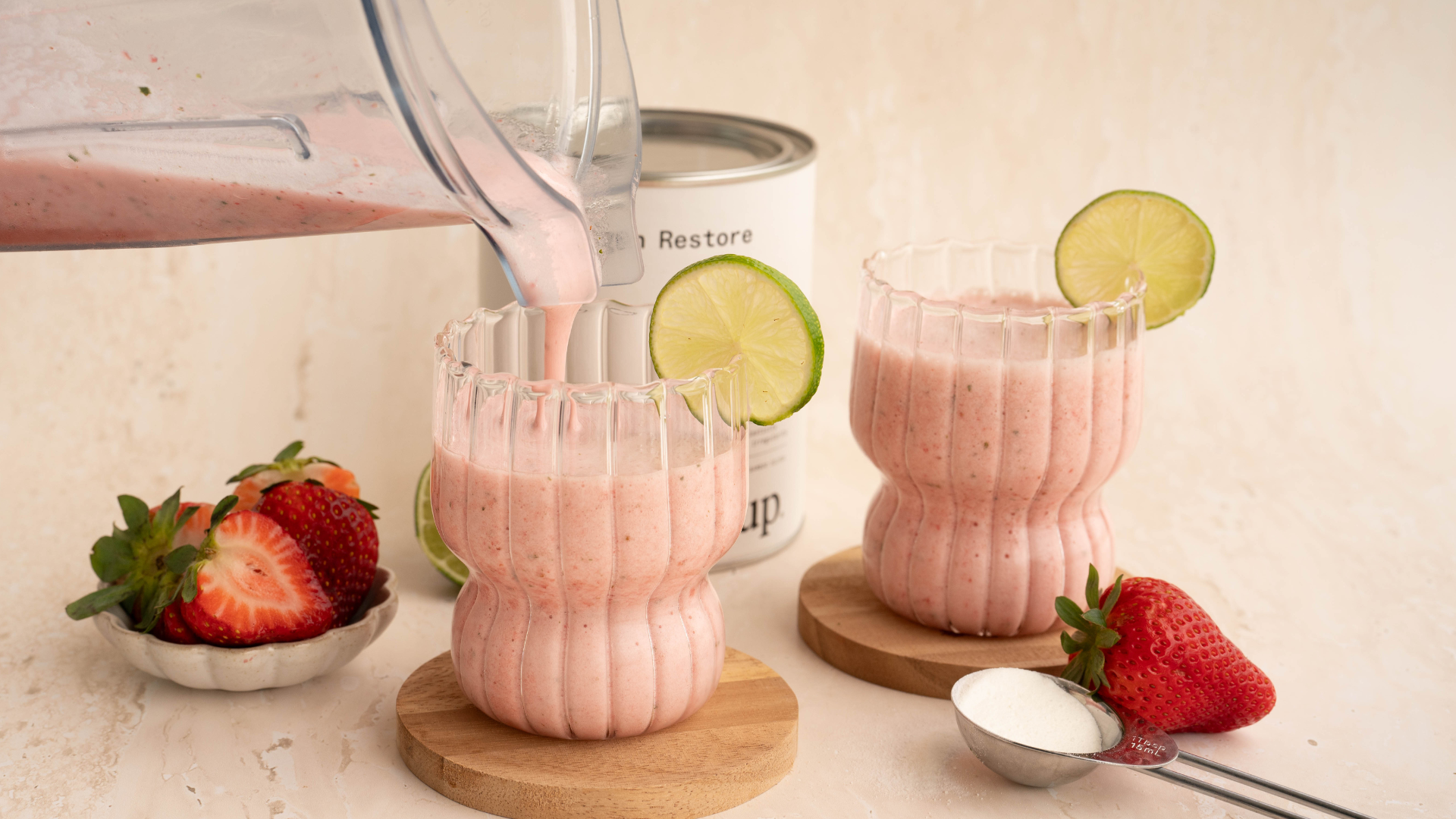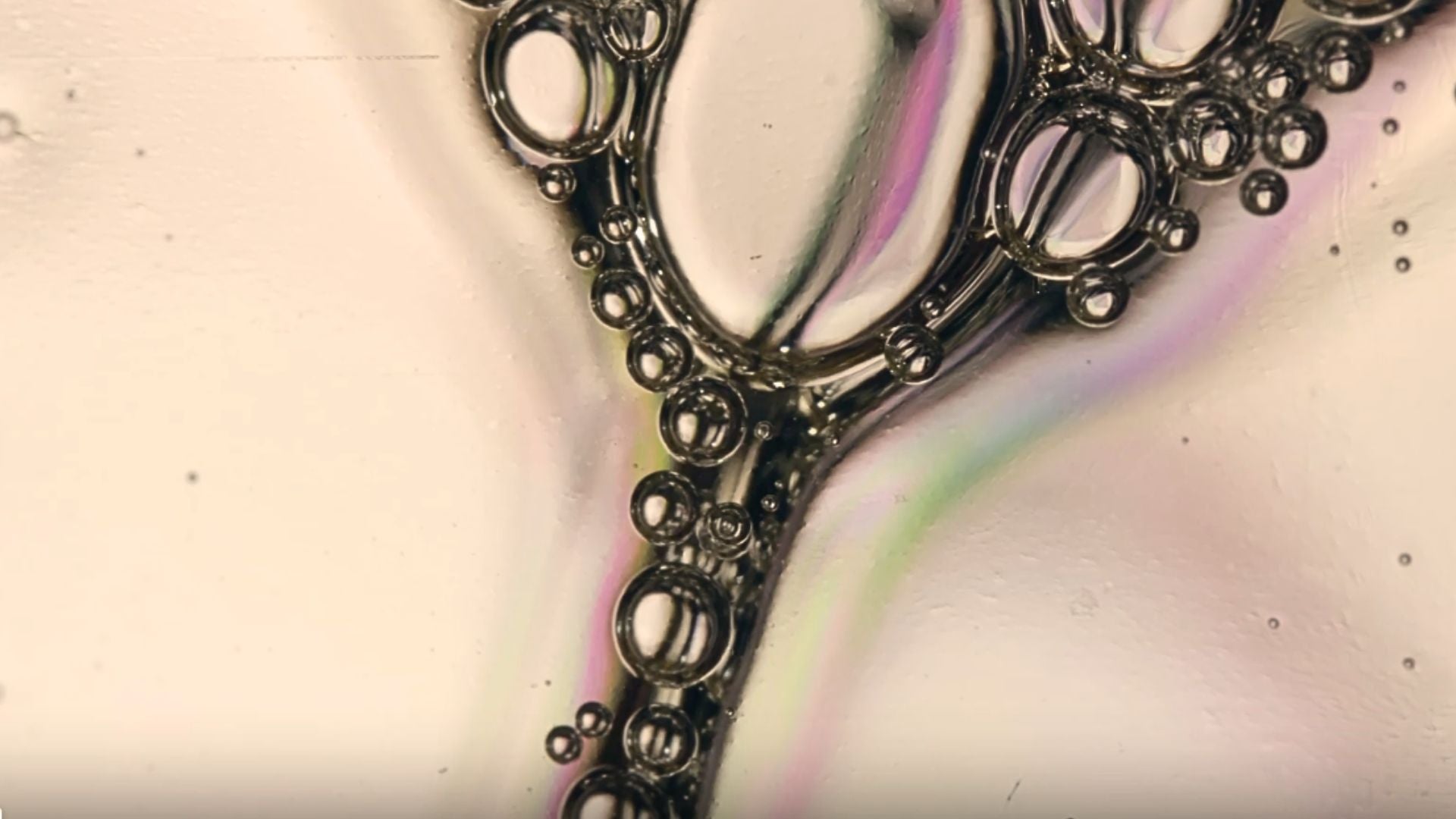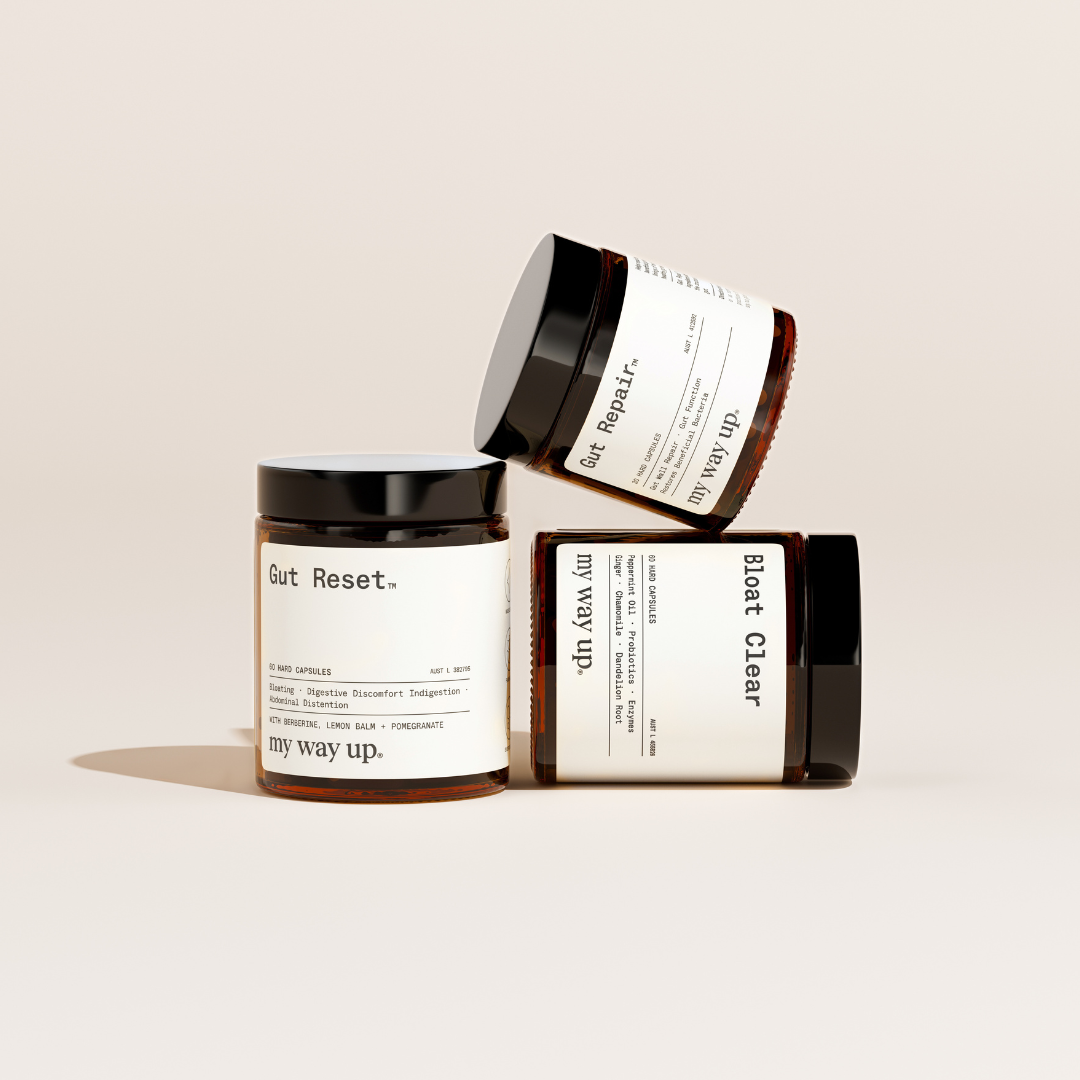How to Strengthen Menopausal Skin

Gut Smarter
Ready to say goodbye to crepey skin for good?
In this article, you’ll discover why menopause marks a turning point in skin aging, and how to support your skin from within to restore firmness, hydration, and glow.
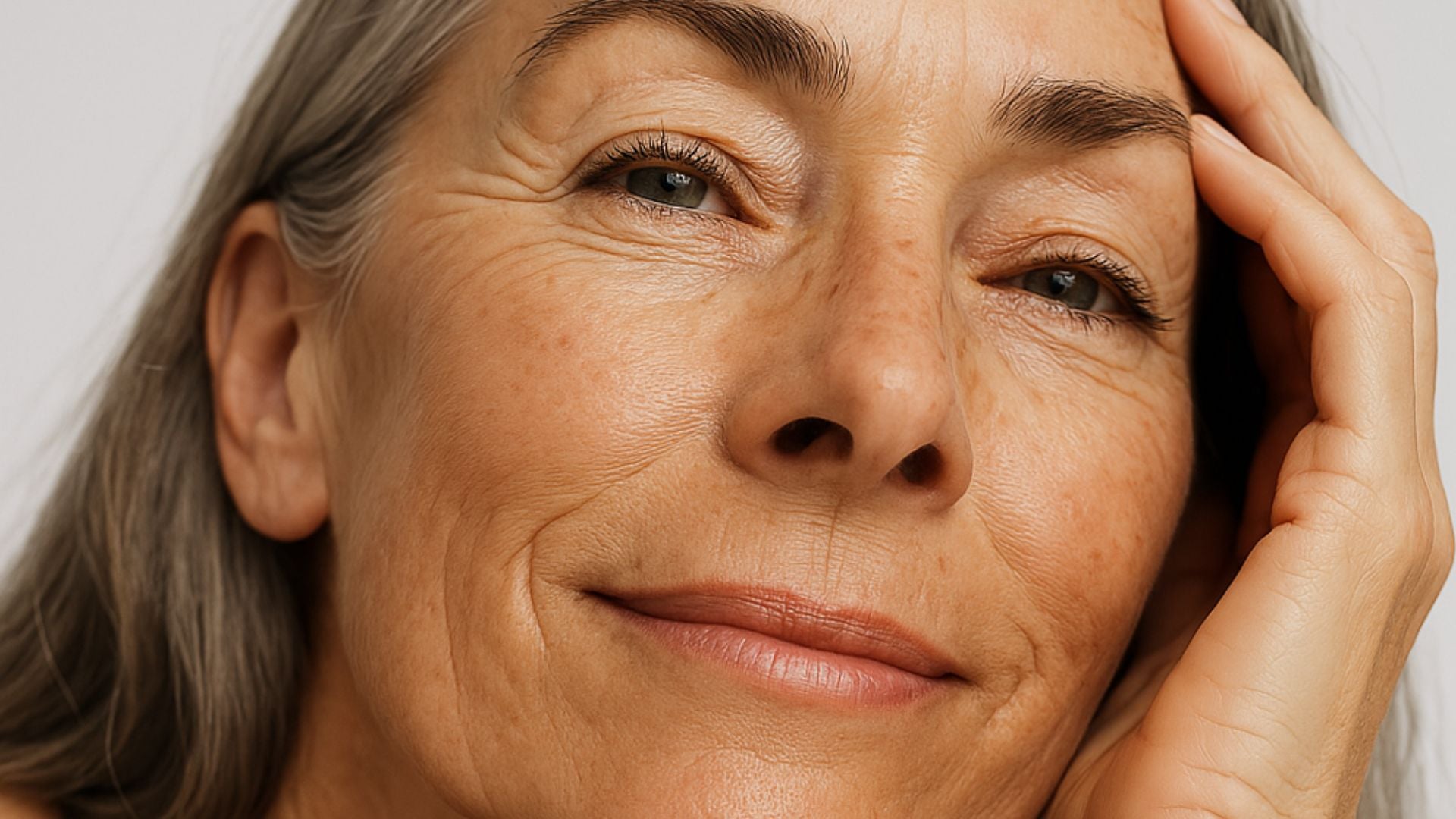
Menopause and Skin Ageing—A Natural Process
Menopause is a natural biological transition that marks the end of a woman's menstrual cycles, defined as [1]:
- Twelve consecutive months without menstruation (i.e. amenorrhoea),
- Typically occurring around the age of 50,
- Driven by hormonal changes—particularly a sharp decline in oestrogen.
Deeply impacting all skin layers—from hypodermis to epidermis:
- Reduced collagen production
- Lower water content—due to a drop in glycosaminoglycans (those sugar chains that act like natural water magnets in your dermis)
- Loss of skin elasticity and thickness
- Decreased resistance of skin cells (i.e. fibroblasts and keratinocytes) to oxidative stress
- Increased wrinkles.
Meet the Factors that Worsen Skin Ageing
Environmental Factors
Chemical and physical aggressors accelerate skin ageing by causing high levels of oxidative stress, inflammation, and breaking down collagen and elastin fibres [2,3]:
- Ultraviolet (UV) Radiation—Sun Exposure
Photoageing has long been recognised as a serious concern, particularly due to the associated skin cancer risk.
Menopause weakens the skin’s structure and defences, making it more vulnerable to photodamage [4,5].
Interestingly, moderate UV exposure during adulthood might have a positive effect, delaying the onset of menopause through vitamin D production, which impacts ovarian reserve [6].
However, the benefits/risks balance leans towards protecting your skin from UV damage by wearing sunscreen and ensuring you get vitamin D from your diet.
- Air Pollution
Includes particulate matter, nitrogen dioxide (NO2), and ozone, as well as cigarette smoke.
Notably, an observational study on Asian women over 15 years found a link between long-term air pollution exposure and a younger age at menopause [7].
- Combined Effects: UV + Pollution
Air pollution and UV radiation can interact synergistically, amplifying the damage to the skin.
Lifestyle Factors
Here’s a list of factors you should consider to limit skin ageing and support hormonal health:
Harmful Chemicals
Especially Endocrine-Disrupting Chemicals (EDCs), which interfere with your hormones.
EDCs from our environment can accelerate reproductive ageing, causing women to reach menopause at earlier ages [8].
Found in many contaminated foods and packaging, as well as drinking water: pesticides, heavy metals, per- and poly-fluoroalkyl substances (PFAS), bisphenols (BPA), polychlorinated biphenyls (PCBs), dioxins, etc.
Found in cosmetics: parabens, phthalates (often listed as fragrance/parfum), benzophenones & oxybenzone (in chemical UV filters), aluminium salts (in antiperspirants and deodorants).
Poor Habits & Diet
- Cigarette and Heavy Alcohol Use
An observational study across the United States, Canada, Australia and the United Kingdom showed the significant negative impact of smoking and heavy drinking on skin ageing in women aged 18 to 75 years old [9].
However, low to moderate alcohol consumption (up to three drinks per week), particularly white wine (no effect observed with beer), may lower the risk of early menopause [10]—which is associated with a decreased risk of cardiovascular disease and premature death.
Several studies comparing women with moderate alcohol consumption and those with no alcohol consumption found a modest but significant better outcome of moderate alcohol intake on menopause onset [11]—it appears certain alcoholic beverages, when consumed moderately, impact hormonal balance, including oestrogen levels [12].
Yet, this impact is not fully understood. While moderate alcohol consumption may delay menopause, it is crucial to consider the potential health risks associated with alcohol, including breast cancer.
The best advice is to keep alcohol consumption occasional and for pleasure, rather than relying on its modest, likely, and not fully understood health benefits—benefits that come with other negative health outcomes (remember, alcohol is a substance your body needs to detoxify!).
- High-Glucose Intake
In addition to the well-known and serious metabolic disorders caused by long-term high sugar intake, Advanced Glycation End-products (AGEs)—produced from sugar and amino acids (i.e. the building blocks of proteins)—accumulate over time.
These AGEs can bind with collagen molecules, leading to tissue ageing and a loss of skin elasticity [1].
Excess sugar intake triggers this process, accelerating skin ageing and contributing to inflammation in your body, and even affecting your brain.
Poor Sleep
Poor sleep quality has been linked to skin ageing in middle-aged women, particularly in the context of oxidative stress and hormonal imbalance [13].
While sleep issues can accelerate skin ageing, menopause is often associated with sleep complaints.
However, a recent study published in the highly regarded journal Sleep assessed sleep outcomes in midlife women over a 10-year period, from pre-menopause to post-menopause (with measurements taken at ages 46 and 56). Interestingly, this transitional phase didn’t worsen sleep; on the contrary, sleep latency shortened and the amount of deep sleep increased [14].
Lack of Exercise
Exercise can positively influence hormonal balance, helping to slow the decline in oestrogen levels.
For example, a 12-week resistance band training program successfully countered age-related hormonal decline in postmenopausal women with hypertension—a condition commonly associated with menopause [15].
Other aspects of health are also positively affected, including sleep, body composition, and mental wellbeing—particularly through mind-body exercises like yoga and Pilates [16].
Chronic Stress
Chronic stress significantly disrupts skin balance and accelerates skin ageing. Long-term exposure to high levels of stress hormones like cortisol can lead to both cellular and epigenetic damage [17,18]:
Epigenetic modifications are heritable marks added onto your DNA depending on your lifestyle and everything you experience—including stress. These marks influence how your genes are expressed and regulated.
Cellular damages are associated with decreased extracellular matrix production—your structural skin mesh weakens:
- impaired skin barrier function
- reduced resistance to oxidative stress
- delayed wound healing
- increased signs of microrelief alterations (such as skin texture and fine lines)
Collagen Restore™
A high-tech collagen formula that works to restore plump, firm, bouncy skin and improve gut health and function.
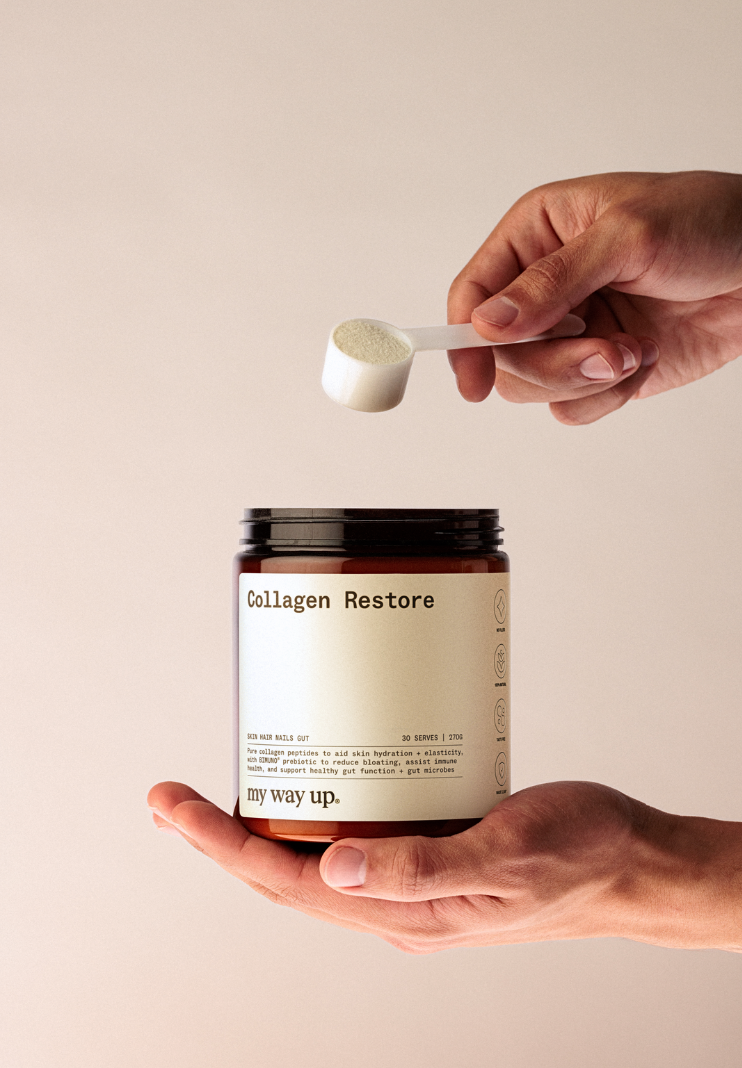
How you Can Slow Down and Counteract the Ageing Process
For many years, Hormone Replacement Therapy (HRT) using female hormones was seen as the go-to option for relieving menopausal symptoms. However, in recent decades, this external (often synthetic) supply of oestrogens has raised concerns, particularly for women without medical conditions that strictly require treatment. As a first-line approach, HRT has shown a complex risk–benefit profile and, for many, may increase the risk of serious health issues—including cardiovascular disease and hormone-sensitive cancers such as breast and endometrial cancer [2].
Healthy Habits on Your Plate
A gut-loving, nutrient-rich diet naturally helps combat ageing by:
- Strengthening your defences against oxidative stress
- Supporting hormonal balance
- Reducing inflammation
- Promoting healthy cell regeneration
All of these pillars are essential for glowing and resilient skin—especially during menopause.
Here are the top food categories to support your skin and slow down menopause-related ageing—from the inside out!
Antioxidants
- Vitamin A & Carotenoids
Vitamin A isn’t synthesized by the human body—it must come from your diet, either as retinol (the active form) or beta-carotene (a provitamin A).
Vitamin A- and carotenoid-rich foods have been shown to offer photoprotective benefits, boosting the skin's natural defence against UV damage and oxidative stress [2].
For example:
A 12-week supplementation with a tomato nutrient complex containing lycopene and lutein significantly reduced UV-induced oxidative stress and signs of photoageing [19].
Just 85 g of mango daily significantly reduced wrinkle severity in postmenopausal women after 8 weeks—though interestingly, a higher dose of 250 g had the opposite effect [20].
Beta-carotene-rich foods: carrots, sweet potato, red capsicum, pumpkin, mango, apricot, dark leafy greens (spinach, kale)
Retinol-rich foods: liver, cod liver oil, egg yolks, butter, cheese, oily fish, and full-fat dairy
Lycopene-rich foods: tomatoes, watermelon, papaya
Lutein-rich foods: dark leafy greens like spinach and kale
- Vitamin C
Vitamin C (i.e. ascorbic acid), is found in high concentrations in the skin and has long been recognised for its powerful role in boosting collagen synthesis—a fact proven as early as 1994 in studies on elderly fibroblast cells! [21]
Vitamin C is essential for the production of pro-collagen, the precursor to collagen:
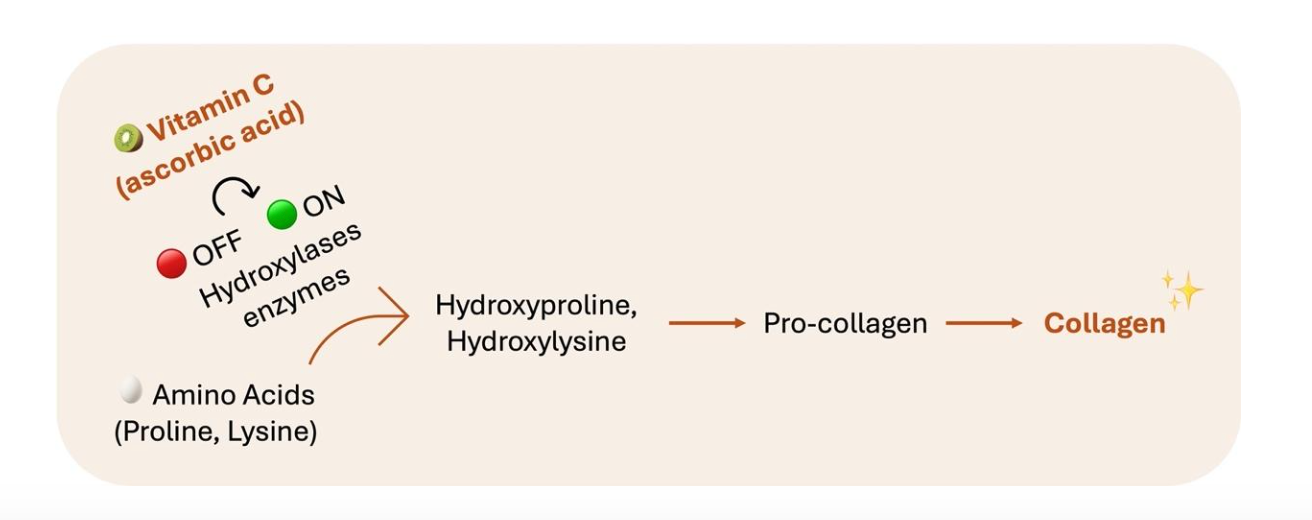
Vitamin C also acts as a potent antioxidant, protecting skin cells from oxidative stress.
For example, in an in vitro model, vitamin C helped prevent epidermal damage caused by exposure to pollutants and UVA1 radiation combined [22].
Like most vitamins, your body can’t produce vitamin C on its own—so you need to get it from your diet.
Vitamin C-rich foods: oranges, kiwifruit, papaya, lemon, strawberries, pineapple, capsicum, broccoli, cabbage
- Vitamin E
Vitamin E (i.e. tocopherols) is a lipid-soluble vitamin with powerful antioxidant properties, particularly abundant in the epidermis. As the skin’s first line of defence, it strengthens the skin barrier, limits lipid oxidation, and helps reduce the risk of skin damage [23].
Specifically, Vitamin E plays a protective role against skin photoageing, neutralising the free radicals generated by UV exposure.
For example, two studies showed that daily almond consumption in postmenopausal women for 16 to 24 weeks led to a significant reduction in both wrinkle severity and facial pigmentation intensity [24,25].
Vitamin E works synergistically with other micronutrients—its antioxidant activity is enhanced by vitamins C and B3, selenium, and glutathione (i.e. a vital antioxidant produced by the body from specific amino acids, also found in garlic, onions, and cruciferous vegetables like broccoli).
Vitamin E-rich foods: nuts (almonds, hazelnuts), seeds (sunflower seeds), vegetable oils (sunflower oil, olive oil), and green leafy vegetables (spinach, broccoli)
- Polyphenols—Phytoestrogens
Polyphenols are a large group of plant compounds—often responsible for the vivid colours in fruits, vegetables, and herbs—that play a protective role in plants.
When we consume them, we benefit from their antioxidant and anti-inflammatory effects, which help prevent collagen breakdown and support pro-collagen synthesis [26].
Several powerful polyphenols have been shown to support skin health and combat photoageing when taken as oral supplements or used in dermo-cosmetics:
Curcumin: found in turmeric
Catechins): found in green tea
e.g. epicathechin (EC), epicathechin-3 gallate (ECG), catechin-3 gallate (CG), and epigallocathechin-3 gallate (EGCG)
Resveratrol: found in grapes
Isoflavones: found in soy and soy-based foods
e.g. daidzein, genistein and glycitein
Silymarin: found in milk thistle
Anthocyanins, ellagitannins and ellagic acid: found in pomegranate
- Zoom on Phytoestrogens (Isoflavones and Liquiritigenin)
Plant-derived isoflavones are especially relevant for peri- and postmenopausal women due to their structural similarity to oestrogens.
Alongside compounds like liquiritigenin (a type of flavanone), isoflavones are commonly grouped as phytoestrogens—natural substances that can bind to oestrogen receptors and mimic some of their effects.
That said, their hormonal activity is much weaker—ranging from 100 to 100,000 times less potent than human oestrogens [27].
Isoflavones are known for their antioxidant, anti-inflammatory and chemoprotective properties.
They may help ease menopausal symptoms by [28–30]:
- Increasing hyaluronic acid levels,
- Stimulating production of extracellular matrix proteins (i.e. collagen, elastin, glycosaminoglycans),
- Reducing bone mineral density loss,
- Improving glycaemic control and lipid profile.
Interestingly, isoflavones can be converted into more powerful forms by bacteria—either during fermentation in your food (i.e. fermented products) or directly in your gut [26].
Two randomised controlled trials (RCT)* found that soy protein with isoflavones (ranging from 50 to 209 mg) significantly improved skin ageing, wrinkles, and hydration in postmenopausal women over 12 to 24 weeks [30,31].
Another phytoestrogen of interest is liquiritigenin, a compound found in high amounts in liquorice rhizome (G. uralensis), traditionally used in Chinese medicine.
A lab study on human skin cells (i.e. fibroblasts) found that liquiritigenin helped boost collagen production and blocked an enzyme (MMP1) that breaks down collagen and elastin—damage often caused by sun exposure and pollution [32].
* What is a randomised controlled trial (RCT)?
An RCT is a type of scientific study where people are randomly split into groups to test a treatment—one group gets the real thing, the other a placebo. In a double-blind RCT, neither the participants nor the researchers know who’s getting what, which keeps the results fair and unbiased.
- The Role of Lipoic Acid
Lipoic acid, which the body produces in small amounts, is known for its powerful ability to regenerate other antioxidants and protect mitochondria (i.e. the energy powerhouses of our cells).
It supports cellular integrity and function, which is key to slowing down age-related skin changes [2].
You’ll found it in small amounts in spinach, broccoli and potatoes. Supplements may also be beneficial—alpha-lipoic acid is commonly available in capsule or tablet form.
Collagen
Collagen is a vital structural protein found in connective tissues such as skin, tendons, cartilage, and bone—accounting for approximately 25–30% of the total protein content in the human body.
Within the skin, collagen—along with other key components like hyaluronic acid, reticulin, and elastin—forms a supportive network for skin cells (including fibroblasts, keratinocytes, melanocytes, and immune cells).
Collagen is rich in specific amino acids—hydroxyproline, proline, and glycine.
To support your body’s own collagen synthesis, it’s important to provide these building blocks through your diet and/or supplementation.
Main food sources include bone broth, chicken skin, beef or pork tendons, fish skin and scales, gelatine, and connective tissue-rich cuts like oxtail or brisket.
However, collagen must be broken down into smaller components—namely di- and tripeptides, and free amino acids—to be absorbed and distributed effectively throughout the body.
That’s where supplements come in:
Most collagen supplements are hydrolysed, meaning they’ve been broken down by specific enzymes into smaller peptides that are more bioavailable—able to be absorbed directly through the gut into the bloodstream.
These are often referred to as low-molecular-weight peptides, meaning their size is typically under 5000 Daltons (i.e. the common unit used to express protein size) [33,34].
Beyond simply providing the building blocks for the body's own collagen production, collagen peptides also appear to stimulate skin cell metabolism:
- Enhancing the synthesis of key extracellular matrix proteins such as collagen, elastin, and glycosaminoglycans
- While inhibiting their breakdown by specific enzymes (i.e. matrix metalloproteinases—MMPs)
Two recent meta-analyses reviewing several RCTs (some involving postmenopausal women) show that hydrolysed collagen can improve skin health and appearance—reducing wrinkles and boosting firmness and elasticity by [35,36]:
- Increasing fibroblast activity and thus collagen production
- Strengthening the skin barrier, which prevents moisture loss
These effects were observed:
- after a minimum of four weeks of supplementation,
- with daily doses ranging from 300 mg to 5 g,
- using collagen sources from porcine, bovine, chicken, or fish.
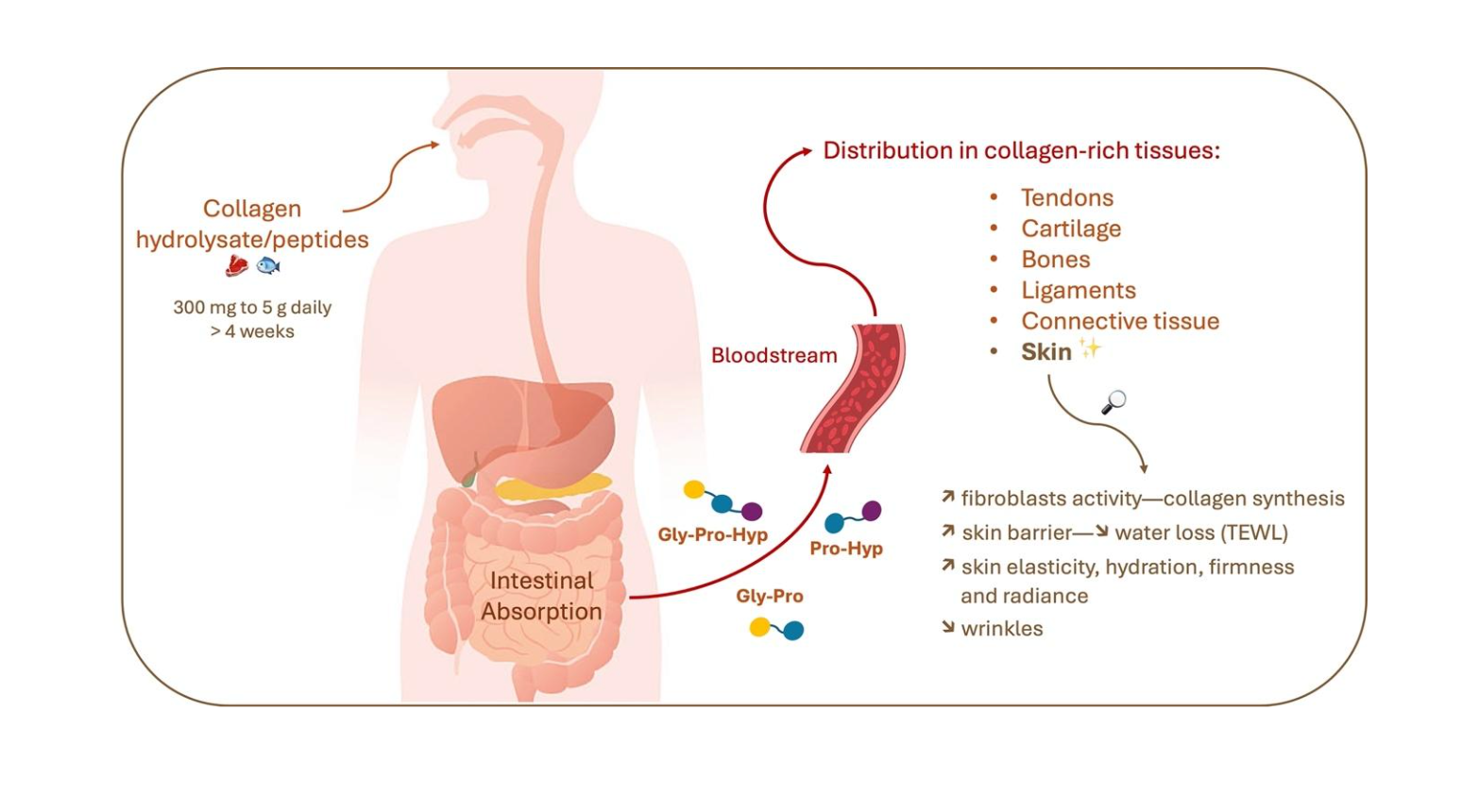
Mixes of Micro- and Macro-nutrients
All the powerful micronutrients discussed above often work synergistically. Fortunately, with a balanced, varied diet, made up of high-quality foods, you can naturally support your health and slow down the ageing process.
Still, health supplements can help you achieve optimal levels of these micronutrients, which may be difficult to reach depending on:
- Your lifestyle (e.g. vegan diet or limited access to high-quality food)
- Personal conditions (e.g. high-level athletes or food intolerances/allergies)
That's why all-in-one formulations—containing a range of powerful ingredients working together—are often used to promote overall health and slow down skin ageing.
Over the past few decades, several studies have investigated the synergistic effects of micronutrient combinations, with or without macronutrients, on skin ageing.
A quick reminder:
- Micronutrients are required in small amounts and don’t provide energy (i.e. no calories). They include vitamins, minerals, trace elements, and antioxidants.
- Macronutrients are larger molecules that provide energy (except for fibre). These include proteins (such as collagen), fats/lipids (like omega-3s), and carbohydrates (note: fibre is technically a type of carbohydrate but isn’t digested for energy—well, not by us, but it feeds our good gut bacteria!)
Some examples:
- A randomised controlled trial from 2014 was the first to demonstrate, using an oral product, that the improvement in wrinkles was associated with an increased deposition of new collagen fibres in the dermis. The benefits were clinically measured after 14 weeks of using a mixture of soy isoflavones, lycopene, vitamin C, vitamin E, and fish oil [37].
- Another more recent RCT, conducted over 8 weeks, studied the effect of a vitamin-containing amino acid supplement. This supplement specifically included three amino acids (leucine, glutamine, and arginine—LGA) and 11 types of vitamins (A, C, D, E, and 7 from the B-group). The results showed improvements in menopausal symptoms and age-related changes in the skin (e.g. wrinkles) compared to the placebo group [38].
- The antioxidant power and effects on skin ageing symptoms of two different supplements were tested over 90 days in women and men aged 40-65 (RCT-style study). Both the antioxidant cocktail (containing trans-resveratrol, selenium, vitamin E, and vitamin C) and the fermented papaya preparation showed improvements in skin elasticity, moisture, and antioxidant capacity [39].
Remember, the antioxidant power of food can be boosted through fermentation!
- A dietary supplement containing a mix of micro- and macro-nutrients (soy extract, fish protein polysaccharides, white tea extracts, grape seed, tomato, vitamins C and E, zinc and chamomile extract) showed positive effects on the skin of postmenopausal women after 6 months. It improved wrinkles, mottled pigmentation, laxity, sagging, and skin density [40].
Mixes Containing Collagen Peptides
Collagen peptides are often found in combination with other nutrients such as antioxidant vitamins or minerals like vitamins C, A and E, or zinc.
Among these, vitamin C is the preferred association, given its essential role in pro-collagen and collagen synthesis [41,42].
Water
Staying well hydrated is the absolute foundation for healthy skin—to maintain skin hydration and elasticity.
Dehydrated skin becomes more prone to fine lines and sagging.
Opt for filtered water to avoid chemical contaminants.
Collagen Restore™
A high-tech collagen formula that works to restore plump, firm, bouncy skin and improve gut health and function.

Collagen Restore as Your Favorite Ally Against Crepey Skin
Collagen Restore is a powerful blend of four ingredients specifically designed to target both skin and gut health.
Collagen Peptides
- The collagen peptides in Collagen Restore come from the hydrolyzation (i.e. enzymatic breakdown) of grass-fed, Australian-sourced bovine collagen.
- Collagen peptides supplementation provides the essential building blocks (i.e. specific amino acids—proline, hydroxyproline, glycine) and stimulates skin cell activity, promoting the body’s natural collagen production.
- Collagen Restore contains high-quality, small collagen peptides that are highly bioavailable and easily absorbed by the gut.
- The daily dose is tailored to support the body’s declining collagen production during the ageing process, particularly for peri- and postmenopausal women, who experience a significant decrease in collagen production due to the drop in oestrogen levels.
Bimuno® GOS (Galacto-oligosaccharides)
- Bimuno GOS is a prebiotic—a compound specifically nourishing the beneficial bacteria in your gut microbiota.
- This specific fibre stimulates the growth of short-chain fatty acid (SCFA)-producing bacteria, such as Bifidobacteria [43,44]. These SCFAs (including butyrate, propionate, and acetate) serve as a fuel source for gut cells, supporting healthy gut functions.
- Maintaining a healthy gut is crucial for preventing inflammation and ensuring proper nutrient absorption, which in turn helps nourish your skin.
Organic Bamboo Silica
- Bamboo has been used in Ayurveda and Traditional Chinese Medicine for various health concerns, including skin care.
- Rich in silica, a mineral and trace element, it supports collagen production, improving skin elasticity [45].
- Silica (from various sources) has also been shown to enhance skin barrier function and prevent photoageing by inhibiting the collagen-degrading enzyme (i.e. MMP-1) induced by UVA in human fibroblasts [46].
Zinc Gluconate
- Zinc is an essential trace mineral for skin health, known for its antioxidant, photoprotective, and wound-healing properties [47].
- The gluconate form of zinc is well-absorbed and particularly well-tolerated, helping to protect the intestinal barrier and reduce gut inflammation [48].
- In the skin, zinc gluconate also helps mitigate oxidative stress and exerts anti-inflammatory effects in the epidermis [49].
Key Takeaways
- Menopause is a natural phase of life, but it often brings significant skin changes due to hormonal fluctuations—particularly the sharp decline in oestrogen.
Skin is one of the most visibly affected organs during this transition, with overall skin quality commonly declining at this stage of life [1].
- Environmental and lifestyle factors—such as sun exposure, poor diet, and chronic stress—can further accelerate skin ageing.
- Supporting your skin from within is essential to counteract these changes. Aim for a nutrient-rich diet, stay well hydrated, and include antioxidant-rich and collagen-boosting foods in your meals.
- Collagen Restore can be a valuable ally, helping to reduce signs of menopausal skin ageing, improve skin elasticity, and combat crepey skin.
Editorial Standards
My Way Up® has strict sourcing guidelines to ensure our content is accurate and current. We rely on peer-reviewed studies, academic research institutions, and medical associations.

